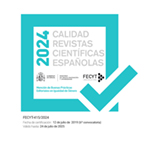Science influencers on Twitch: Science communication by video-streaming in times of COVID-19
Abstract
In recent years, and accentuated by the health crisis, the consumption of content on online video platforms has increased as an alternative to traditional audiovisual media. Focusing on the Spanish context, this article explores the communications of science influencers on Twitch, the predominant videostreaming platform, popular with gamers, esports and various other forms of social media entertainment. The study conducted a content analysis of audiovisual texts generated by a sample of six of the most representative Twitch science communicators in Spain on the basis of a set of semiotic-discursive categories. The analysis identified the discursive strategies underlying the analyzed texts and identifies the particularities of a type of science communication that coexists within the media ecosystem with old media and official scientific sources. Specifically, the science communicators on Twitch opt for an audiovisual format based on the personality vlog, a form of speech characterized by a didactic expressive articulation, synchronous interaction with the user, and the use of a fun tone based on shared community codes. Despite being a new type of science communication, and the ephemeral nature of the broadcasts, the results of this study suggest that Twitch is an efficient vehicle for attracting the attention of young audiences to scientific content. The results also suggest that the influencers or content creators analyzed are committed to discourses based on informational quality and scientific rigor.
Downloads
Publication Facts
Reviewer profiles N/A
Author statements
- Academic society
- N/A
- Publisher
- Grupo de Investigación Cultura Digital y Movimientos Sociales. Cibersomosaguas
Article download
License
In order to support the global exchange of knowledge, the journal Teknokultura is allowing unrestricted access to its content as from its publication in this electronic edition, and as such it is an open-access journal. The originals published in this journal are the property of the Complutense University of Madrid and any reproduction thereof in full or in part must cite the source. All content is distributed under a Creative Commons Attribution 4.0 use and distribution licence (CC BY 4.0). This circumstance must be expressly stated in these terms where necessary. You can view the summary and the complete legal text of the licence.













